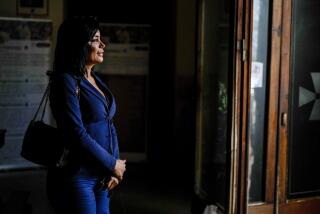Mother Teresa Nuns Aid Manila’s Poor
MANILA — In northern Manila’s Tondo slum, where waifs wander the streets aimlessly, pressing their noses against the windows of cars at traffic lights, a group of Catholic nuns works to feed the destitute, help the sick and ease death for incurables.
“We take in all ages. Some we can help, some are just here to die,” said Sister Christopher, who belongs to the Missionaries of Charity, the order founded in Calcutta by Mother Teresa.
Sister Christopher leads a team of 13 other nuns and volunteer helpers and doctors who feed, wash and comfort 300 children, many suffering from tuberculosis, and 80 adults, most of them old, ill and psychologically disturbed.
Some come to the missionaries’ Tondo center and ask for help, some are found on the streets by the nuns and some are brought in by their families.
“Among the children about one to two die every day,” Sister Christopher said, gesturing at the simple medical ward and dormitory where the children are housed.
“Some of them arrive when they’re 1 or 2 days old. Either they’re abandoned or the mothers bring them in and say they haven’t got the money to look after them,” she added.
Sister Bernadette, who is in charge of the children’s dormitory, said some children arrive after terrible parental abuse.
“This one was brought here when he was 2 days old. He’s completely blind and has burns all over him,” she said.
She rolled up a soiled shirt to reveal scars on the chest of a small boy in a cot. “We don’t know what’s wrong with him now. He’s 2 years old now,” she added, adjusting a saline drip connected to his left foot.
“We thought he would go last night, but he’s still here,” said Sister Christopher, who came to Manila from India 2 1/2 years ago and now coordinates the work of the order in the Philippines.
Across the room a skeletal boy, who Sister Bernadette said is 3 years old but weighs only 11 pounds, moved his arms feebly in the air.
“His mother brought him five days ago,” Sister Christopher said. “Sometimes they really cling to them. You know, they really don’t want to give them up, but they have to.”
The Tondo center’s medical clinic treats 450 tuberculosis outpatients and a total of 2,000 outpatients who have fallen through the overstretched government health service net, according to Sister Maria Jose, an Australian who came to the center eight years ago and who runs the outpatient clinic.
“The government says 80% of the poor have TB. Working here, I can believe it,” she said as she tended a young boy perched on a high stool in the center of the clinic’s hot and stuffy treatment room.
The government’s Tuberculosis Control Service says the official figure is high because it includes cases showing symptoms and not just those with the fully developed disease.
“Eighty percent in the slum areas of metropolitan Manila is possible--the national average is around 54%--but I think it’s unlikely to be quite that high,” said Dr. Jaime Laghid, one of the service’s medical specialists.
Laghid said the service depends on the work of groups such as the Missionaries of Charity because the government’s annual allocation of $6.6 million for the tuberculosis program is insufficient.
The missionaries also feed some 70 destitute families a day.
“They have no food, no money, no homes, nothing,” said Sister Christopher.
According to the Department of Social Welfare’s most recent figures, in 1988 only 3,160 of metropolitan Manila’s 7.5 million inhabitants were defined as homeless and only 661 as destitute.
But Corazon Alma DeLeon, an undersecretary at the department, said this figure did not include 400,000 families who squat in miserable shacks often propped up on the capital’s garbage dumps, or an estimated 75,000 street children.
“It also doesn’t include those coming into Manila from rural areas, which, judging by the number of squatters, are increasing,” she said.
More to Read
Sign up for Essential California
The most important California stories and recommendations in your inbox every morning.
You may occasionally receive promotional content from the Los Angeles Times.










